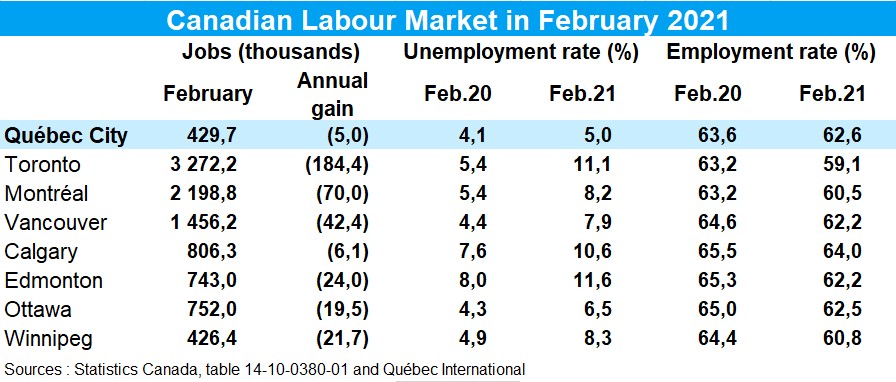Highlights
- The Québec City census metropolitan area’s (CMA) labour market lost 7,000 jobs (-1.6%) from January to February 2021.
- There are now 5,000 fewer jobs than one year ago (February 2020) in the Québec City region.
- The unemployment rate grew slightly to 5% in February, but the region still maintains the lowest rate among major Canadian CMAs.
- There were 452,600 people in the labour force in February 2021, almost as many as at the same time in 2020.
- Comparable data for the province of Quebec shows that the number of jobs remained relatively stable (-500) in February compared to the previous month. As for the unemployment rate, it decreased slightly to 7.3% in February 2021, while it was 4.9% February 2020.
Charts


Commentary
Statistics Canada’s Labour Force Survey (LFS) data for February shows the labour market conditions during the week of February 14 to 20. Compared to January, February data reflects the loosening of public health restrictions, including the reopening of non-essential stores on February 8. Despite these changes, February data is less favourable than in previous months.
Employment declined in February
According to Statistics Canada, the number of people employed in the Québec City CMA was 429,700 in February, 7,000 fewer than in January (-1.6%). This is below the monthly results observed at the provincial and national levels. Nevertheless, the total number of jobs in the Québec City region shows a lower lag over one year (February 2020, before the economy came to a halt), than most Canadian regions.
Twelve months later, the market is tightening...
The unemployment rate in February was estimated at 5%, a slight increase compared to the previous month (4.7%). The Québec City region has the lowest rate among major Canadian CMAs. Note that for the Québec City CMA, this unemployment rate remains historically low. Moreover, despite Statistics Canada counting 1,400 more unemployed people in February than in January, for a total of 22,800, the number of unemployed people decreased faster than in the rest of the country. This comes after a peak of 52,700 unemployed people in June 2020. For comparison, there were 18,700 unemployed people in February 2020.
... faster than in other regions
There were 452,600 people in the labour force in February 2021, 5,500 fewer than in January and 800 less than the previous year (February 2020). Moreover, the labour force participation and employment rates decreased on a monthly basis, reaching 65.9% and 62.6% in February. These rates remain comparable to those registered last year (February 2020). It should be noted that the tightening of the labour market seems especially pronounced in the Québec City region compared to other major Canadian CMAs. In the rest of Canada, employment and labour market participation indicators show a higher lag over one year.
A 12-month analysis of the region’s labour market evolution will be published in the coming weeks.
Cautionary Note
The available data for the Québec City census metropolitan area (CMA) was given special statistical treatment (three-month moving average) due to the small sample size, which has the effect of mitigating the large fluctuations in the data. Thus, the data collected in December and January influenced the estimations published for February. Please also note that we use comparable data for the province of Quebec and other CMAs in this document. To learn more, please visit: these reminders about moving averages (ISQ, in French only).
Émile Émond
Economist
Québec International




